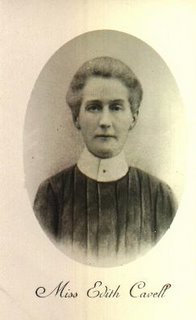Edith Cavell
 Edith Louisa Cavell (December 4, 1865–October 12, 1915) is a World War I heroine.
Edith Louisa Cavell (December 4, 1865–October 12, 1915) is a World War I heroine.Edith Cavell was born in 1865 at Swardeston in Norfolk, where her father, the Reverend Frederick Cavell, was Vicar for 45 years. She trained as a nurse and in 1907 was appointed matron of the Berkendael Institute in Brussels, Belgium.
When World War I broke out, the hospital was taken over by the Red Cross. Nurse Cavell is alleged to have helped hundreds of soldiers from the allied forces to escape from occupied Belgium to the neutral Netherlands, in violation of military law.
In 1915, she was arrested and court-martialled by the Germans for this offence. UK and US diplomats disagreed about whether anything could be done to help her case, with Sir Horace Rowland, from the Foreign Office suggesting "I am afraid that it is likely to go hard with Miss Cavell, I am afraid we are powerless." The sentiment was echoed by Lord Robert Cecil, who joined the coalition government in 1915 as an under secretary for foreign affairs after working for the Red Cross. "Any representation by us," he advised, "will do her more harm than good."
Representing the United States, which had not yet joined the war, Hugh Gibson, First Secretary of the American legation at Brussels, made clear to the German government that executing Cavell would further harm their nation's already damaged reputation. In a statement issued afterward, he noted: "We reminded him (Baron von der Lancken) of the burning of Louvain and the sinking of the Lusitania, and told him that this murder would stir all civilized countries with horror and disgust. Count Harrach broke in at this with the rather irrelevant remark that he would rather see Miss Cavell shot than have harm come to one of the humblest German soldiers, and his only regret was that they had not 'three or four English old women to shoot.'"
She made no defence admitting her actions and was executed by firing squad at 2am on Octobe 12, becoming a popular martyr and entering British history as a heroine.
Representing the United States, which had not yet joined the war, Hugh Gibson, First Secretary of the American legation at Brussels, made clear to the German government that executing Cavell would further harm their nation's already damaged reputation. In a statement issued afterward, he noted: "We reminded him (Baron von der Lancken) of the burning of Louvain and the sinking of the Lusitania, and told him that this murder would stir all civilized countries with horror and disgust. Count Harrach broke in at this with the rather irrelevant remark that he would rather see Miss Cavell shot than have harm come to one of the humblest German soldiers, and his only regret was that they had not 'three or four English old women to shoot.'"
She made no defence admitting her actions and was executed by firing squad at 2am on Octobe 12, becoming a popular martyr and entering British history as a heroine.
The execution took place at the Tir National, a State military site (today a memorial, near the State television buildings), where she was buried. Edith Cavell's case became an important article of British propaganda throughout the war. The German medical officer assisting was the expressionist poet Gottfried Benn (1886-1956), who gave an account of the event.
The night before her execution she told the Anglican chaplain, Rev. Gahan, who had been allowed to see to give her Holy Communion, "Patriotism is not enough, I must have no hatred or bitterness towards anyone." These words are inscribed on her statue in St. Martin's Place, near Trafalgar Square in London.
Her final words to the German pastor, Le Saur were recorded as 'Ask Mr. Gahan to tell my loved ones later on that my soul, as I believe, is safe, and that I am glad to die for my country.'
After the war Edith Cavell's body was exhumed and returned to the UK. A memorial service at Westminster Abbey led by King George V was followed by travel by special train to Thorpe Station, Norwich. She was reburied on Life's Green, at the east end of Norwich Cathedral. Every year a service is held before the grave.
The night before her execution she told the Anglican chaplain, Rev. Gahan, who had been allowed to see to give her Holy Communion, "Patriotism is not enough, I must have no hatred or bitterness towards anyone." These words are inscribed on her statue in St. Martin's Place, near Trafalgar Square in London.
Her final words to the German pastor, Le Saur were recorded as 'Ask Mr. Gahan to tell my loved ones later on that my soul, as I believe, is safe, and that I am glad to die for my country.'
After the war Edith Cavell's body was exhumed and returned to the UK. A memorial service at Westminster Abbey led by King George V was followed by travel by special train to Thorpe Station, Norwich. She was reburied on Life's Green, at the east end of Norwich Cathedral. Every year a service is held before the grave.








0 Comments:
Enviar um comentário
<< Home